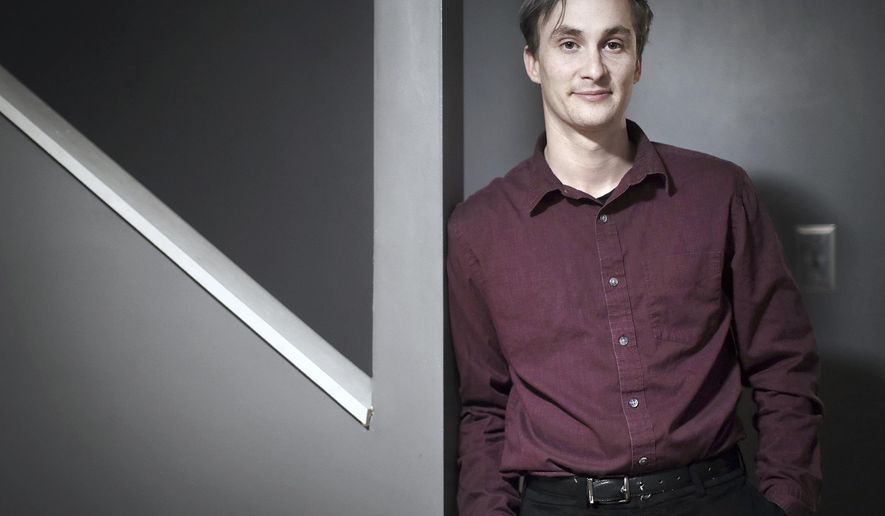EDGERTON, Wis. (AP) - David Johnson is a bearer of good news.
He’s a surgery scheduler who coordinates organ transplant surgeries at University Hospital in Madison.
He’s one of the first people patients talk to when they are going to receive an organ.
That news is life-changing for many people, Johnson said.
After a year of giving people such positive news, Johnson donated a kidney to someone he didn’t know through a process called nondirected donation.
University Hospital had a record 28 people become nondirected donors in 2019, said Leza Warnke, transplant coordinator.
Two people have become nondirected donors in the first three weeks of 2020, which is a strong start to the new year, she said.
Deciding to give
Johnson, who will turn 27 in February, has lived in Edgerton on and off since he was in fifth or sixth grade. He spent some time at Edgerton High School but graduated from Monona Grove High School.
Today, Johnson lives in Edgerton with family and hopes to move to Madison in the near future.
He describes himself as a “fairly physical person.” He likes running and working out and being outside.
After high school, Johnson spent four years in active duty in the Marines before being honorable discharged as a corporal.
Ask Johnson about his job at the hospital and he will tell you everything you need to know about the donation process. He said his job was a “huge influence” in his decision to become a donor, The Janesville Gazette reported.
Johnson began working at University Hospital on Dec. 17, 2018. Before he got the job, he said he didn’t know it was possible to donate an organ to a stranger.
Almost a year later on Dec. 4, he had one of his kidneys removed to be given to a person who needed it.
Johnson said it took time to reach that decision.
One of the most important things University Hospital staff members tell potential donors is to do what’s best for them. They should pursue donation only if they are physically, mentally and emotionally ready, Johnson said.
Johnson said his friends and family initially were hesitant about his plan to give a kidney to a stranger because they were concerned about potential risks.
They eventually came around and were proud and supportive, he said.
Since he returned to work, Johnson has found it a little easier to talk to patients about donation. He does not share his personal experience with patients, but he said he can use his story internally to anticipate what people might be nervous or curious about.
The only thing that surprised him about the surgery, he said, was how normal and unchanged he felt afterward.
The process
The first step in donation involves filling out an online screening form with UW Hospital or the National Kidney Registry.
Screening forms are reviewed by hospital staff, who then reach out to the potential donor to set up a meeting and provide educational resources.
Eligible donors spend a day at the hospital for physical testing and evaluations. Donors meet with a range of medical professionals, including surgeons, nutritionists and social workers, Warnke said.
People who are not eligible are told how to make changes so they can become eligible. If doctors find a donor will never be eligible, they give that person information on how to advocate for organ donation.
Some things that prevent people from donating include uncontrolled hypertension, heart disease, diabetes, active cancer and a lifestyle that indicates a person might not be psychologically ready to donate, Warnke said.
It takes about three to six months to go through the process, she said.
Why he did it
Since his surgery, Johnson has received anonymous letters from the woman who received his kidney. The woman is married, has three kids and is doing well, Johnson said.
He hopes to meet her one day.
The woman’s letter put the experience into perspective for Johnson. He knew the decision he made was the right one.
Donors at University Hospital could have their organs sent anywhere in the country, with help from the National Kidney Registry, Warnke said.
Johnson does not know where the woman who got his kidney lives.
Nondirected donors do not have to pay for their surgeries, Johnson said. Hospitals do not want to prevent people from donating organs because of their inability to pay, he said.
However, donors are responsible for paying for future lab work, lodging and transportation to surgery, Johnson said.
Donor Shield, a national program, can assist financially eligible patients by reimbursing them for lost wages, travel and lodging, he said.
Warnke thinks the hospital’s dedication to improving organ donation processes and public education has encouraged more people to donate.
Many nondirected donors have “humanitarian mindsets” and volunteer in their communities, Warnke said.
Most of them are women.
“Now that people are more informed, numbers have been growing every year,” Warnke said. “And I think people are really desperate for something good to do for humanity, and people are finding ways to give back.”




Please read our comment policy before commenting.